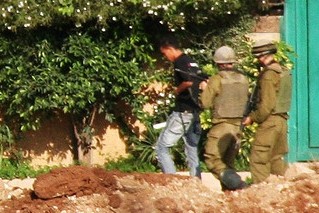 CC-BY-NC-SA: Michael Loadenthal
CC-BY-NC-SA: Michael Loadenthal
On April 6, 2014, the High Court of Justice handed down a partial judgement on two petitions against the excessive and discriminatory detention periods applicable to Palestinian residents of the Occupied Territories (as opposed to Israelis who live in the very same areas). The High Court ordered the state to reconsider its position on three issues: detention periods for Palestinian minors, pre-indictment detention periods for adults suspected of offenses that are not defined as security offenses, and the maximum detention periods from indictment until the end of the trial. The court ordered the state to file its response by September 15, 2014.
The court rejected the petition with regard to pre-indictment detention periods for Palestinian adults suspected of offences defined as security offences (a term broadly defined in the military legislation to include such offenses as organizing an illegal protest), ruling the detention periods reasonable and proportionate, in light of changes enacted by the military in response to the petition. This despite the fact that the detention periods are still significantly longer than those that are applicable to Israeli settlers, who are subject to Israeli law.
The following chart compares detention periods for an adult Palestinian resident of the West Bank suspected of a security offense, to those of an Israeli (in the West Bank or elsewhere):
|
Maximum period of detention |
Palestinians prior to the petition |
Palestinians today |
Israelis |
|
Before being brought before a judge |
Eight days |
96 hours
(option to extend up to 8 days in special cases) |
24 hours
(option to extend up to 96 hours in special cases) |
|
Before an indictment is issued |
90 days
(option to extend for an additional period of up to 3 months with approval of military court of appeals) |
75 days
(option to extend for additional periods of up to 90 days with approval of military court of appeals, upon request of Military Advocate General) |
75 days
After 30 or 35 days authorization is needed from AG
HCJ can extend this period for additional periods of up to 90 days |
Attorney Lila Margalit, Director of Human Rights in the Criminal Process Program at the Association for Civil Rights in Israel (ACRI), filed a petition against the discriminatory detention periods in 2010 on behalf of ACRI, Yesh Din and the Public Committee against Torture in Israel. The Court heard the petition together with a similar petition filed on behalf of the Palestinian Ministry of Prisoner Affairs and several Palestinian attorneys by Attorney Smadar Ben Natan.
ACRI Attorney Lila Margalit: “The petition led to a reduction in the discriminatory gaps between Israelis and Palestinians living in the West Bank with respect to the detention periods applied to them, and more importantly – with regard to certain issues, the Court clarified that it is not willing to settle for the progress that’s been made thus far.
However, she added, “Even after these important changes, Palestinians in the Occupied Territories are still subject to discriminatory detention periods compared to Israelis in the same region. A Palestinian suspected of a crime can be held for a longer period of time before being brought before a judge than can an Israeli accused of the exact same offense.”
Additional Materials







